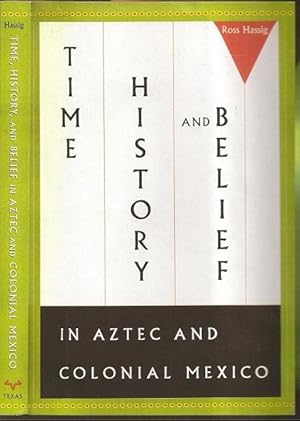hassig ross inscribed (1 Ergebnisse)
Produktart
- Alle Product Types
- Bücher (1)
- Magazine & Zeitschriften
- Comics
- Noten
- Kunst, Grafik & Poster
- Fotografien
- Karten
- Manuskripte & Papierantiquitäten
Zustand
- Alle
- Neu
- Antiquarisch (1)
Einband
- alle Einbände
- Hardcover
- Softcover (1)
Weitere Eigenschaften
Gratisversand
- Versand nach USA gratis
Land des Verkäufers
Verkäuferbewertung
-
Time History and Belief in Aztec and Colonial Mexico
Verlag: University of Texas Press, Austin, 2001
ISBN 10: 029273140XISBN 13: 9780292731400
Anbieter: The Book Collector, Inc. ABAA, ILAB, Fort Worth, TX, USA
Buch Erstausgabe Signiert
Soft cover. Zustand: Fine. 1st Edition. xvi+220 pages with figures, maps, tables, plates, appendix, bibliography and index. Octavo (9" x 6") bound in original wrappers. Inscribed by the author. First edition. Based on their enormously complex calendars that recorded cycles of many kinds, the Aztecs and other ancient Mesoamerican civilizations are generally believed to have had a cyclical, rather than linear, conception of time and history. This boldly revisionist book challenges the understanding. Ross Hassig offers convincing evidence that for the Aztecs time was predominantly linear, that it was manipulated by the state as a means of controlling a dispersed tribute empire, and that the Conquest cut off state control and severed the unity of the calendar, leaving only the lesser cycles. From these, he asserts, we have inadequately reconstructed the pre-Columbian calendar and so misunderstood the Aztec conception of time and history. Hassig first presents the tradition explanation of the Aztec calendrical system and its ideological functions and then marshals contrary evidence to argue that the Aztec elite deliberately used calendars and timekeeping to achieve practical political ends. He further traces how the Conquest played out in the temporal realm as Spanish conceptions of time partially displaced the Aztec one. His findings promise to revolutionize our understanding of how the Aztecs and other Mesoamerican societies conceived of time and history. Condition: Inscribed on title. A fine copy. Inscribed by Author(s).


